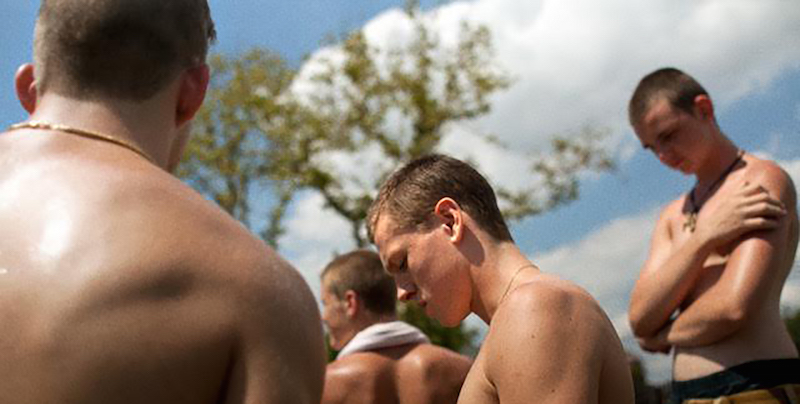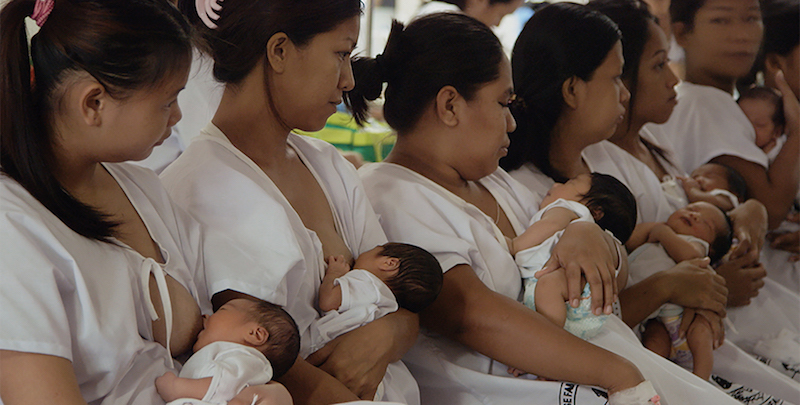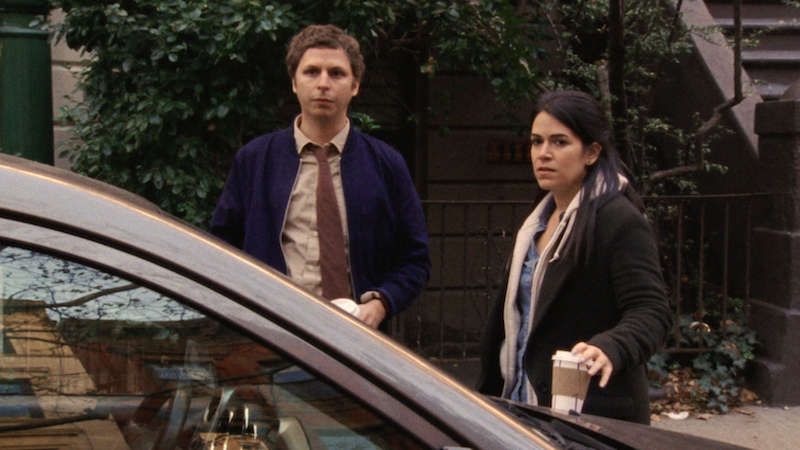
For casual film lovers and cinephiles alike, MD Film Fest really is the most wonderful time of the year. In our May issue, I wrote a feature story on the great reputation the festival has garnered in the indie film community, as well as its exciting new venture, the Parkway Theatre. I also reviewed a buzzed about title with local ties, Rat Film, here.
Below are capsule reviews of a few of the other films playing at the fest, which runs from May 3–7.
Beach Rats
3.5 stars
With It Felt Like Love and now Beach Rats (pictured above), Eliza Hittman has arguably become our greatest chronicler of teenage ennui. It’s summer in Brooklyn and Frankie (Harris Dickinson) spends his long, listless days getting high with his buddies on the beach and his nights prowling an Internet site called Brooklyn Boys looking for older men to hook up with. He’s still deeply in the closet—to his friends, to his mother, even to himself—and he hopes against hope that the feelings will go away. A flirty, pretty girl (Madeline Weinstein) falls for him and he begins to date her—both as an alibi to his friends and to try to will himself to be straight. Meanwhile, his father has just died of cancer, giving him something of a built-in excuse for his moodiness. To the film’s credit, Frankie isn’t secretly pining for any of his friends—they’re knuckleheads—but Hittman shows that there is nonetheless a homoerotic quality to almost all young male friendship, as they hang out on the beach, shirtless, or play strong man games at Coney Island. In one beautiful scene, Frankie goes to a head shop and stands in a haze of smoke as his friends blow perfect smokes rings in his face.
Harris Dickinson, who has the delicate bone structure and high cheekbones of a male model, is extraordinary in his film debut. He plays Frankie as sad and still and wary, with just a barely discernible yearning to be truly seen and understood. At one point, he has a conversation with his girlfriend about the paradox that two girls kissing is universally regarded as hot. “What about two guys kissing?” he asks, hopefully. “That’s not hot,” she replies. “That’s just gay.”
Not much happens in the film—if you like a lot of plot, this one’s not for you—but everything that does happen feels perfect and right.

Motherland
3.5 stars
“Check your privilege” is a popular phrase used to encourage people to be more mindful of the hidden advantages they have in life. Watching Motherland will be a definite check your privilege moment for many, especially women who have given birth in a private room in a world-class hospital. The immersive, cinema vérité style documentary by local filmmaker Ramona Diaz—who is Filipino—takes us inside the busiest maternity ward in Manila. The pregnant women and new mothers here are treated with assembly line efficiency and packed into a warehouse style room, often two to a bed, their screaming and sleeping babies at their sides. They’re dirt poor, some are quite young, and many already have several children waiting at home. We get to know a few of them, like the possibly malnourished young woman who, despite her frail frame, didn’t realize she was about to have twins; the good natured gossip who goes home against medical advice (HAMA) to be with her three other small children; and the mother whose baby somehow gets lost in the shuffle (she is ultimately reunited with a baby, although the film leaves at least some room for doubt that it’s hers). Almost more compelling are the hospital’s staff, who are kind, if unsentimental, in their dealings with the moms. Because the hospital can’t afford incubators, they teach mothers of preemies to do something called Kangaroo Mother Care, i.e., keep their babies tucked into a tight tube top, pressed against their chest for warmth. It’s a Catholic hospital—there are rosaries and pictures of Jesus in the delivery room—so the discussion of “family planning”—tubal ligation or IUDs—is often met with exasperating resistance. Some of the new mothers fear that an IUD is going to hurt; others say that their own mothers have forbidden it. (“And how many children does your mother have?” one social worker responds to such a refusal. “Ten,” the new mother replies.) Motherland somehow manages to be deeply sad and deeply optimistic at the same time. These women have zero privilege, and yet they are treated with as much care and dignity as this under-staffed, under-equipped, and absurdly over-populated hospital can muster.

Person to Person
3 stars
There’s a moment in Dustin Guy Defa’s mosaic-style film, Person to Person, where the camera briefly lingers an attractive young couple having a spat on the Manhattan street—the husband is complaining that the wife hero-worships her father to an annoying degree—and we briefly assume they’re going to be new characters. Instead, the camera zooms in an elderly man making his way to work. He’s a slightly crotchety clockmaker named Jimmy, played by the inimitable Philip Baker Hall, and he’s one of several characters—some interconnected, some not—that Person to Person focuses on. Those characters include a vintage record collector (Bene Coopersmith) who is pursuing a rare Charlie Byrd CD while also obsessing over whether a new shirt is really “him”; a shy young woman (Broad City’s Abbi Jacobson) who joins the investigative team at a newspaper and realizes, almost instantly, that she is not cut out for the job; her supervisor at the paper (Michael Cera), who plays in a terrible metal band and wants desperately to impress her; a heartbroken man (George Sample III) who puts nude pictures of his ex girlfriend on the Internet and almost immediately regrets it; and, most beguilingly, Wendy (Tavi Gevinson), a teenage girl trying to navigate her own messy adolescent mood swings. In all cases, the characters are looking for connection and meaning. But this isn’t a cynical film about how hard it is to have meaningful interactions in our fast-paced digital world. Indeed, the film has an appealingly analog vibe—it’s populated with vintage stores, musty clockmaker shops, and newspaper offices cluttered with filing boxes. What’s more, people actually do find connection—for example, everyone has a carefully considered (and kind) opinion about the record collector’s shirt, including the two guys who own the neighborhood bodega; and Wendy meets a boy she might actually like, in a real way. Person to Person is slight but affecting. It might make you look at that person rushing by you on the sidewalk in a slightly more compassionate way.
Princess Cyd
3 stars
Princess Cyd starts with a scary 911 call—a man and a woman have been found dead; a child is alive in her bed—and then abruptly jumps to “nine years later.” The circumstances of that call recede so much into the background, you almost forget they happened. But in some ways, they dictate everything that follows. Yes, I’m being intentionally vague, but so is writer/director Stephen Cone, who wants to show how tragedy shapes but doesn’t define us.
A survivor of that tragedy is motherless 17-year-old Cyd (Jessie Pinnick) who is spending the summer in Chicago with her novelist aunt Miranda (Rebecca Spence). Miranda lives alone in the rambling home she and Cyd’s late mother grew up in. She has literary parties, where friends come and drink wine and read passages of James Joyce and Robert Frost and the like (as he proved with Henry Gamble’s Birthday Party, Cone has a knack for making a party crackle with authenticity and life). She lectures. She gets recognized in restaurants and told by strangers that her work changed their lives. Meanwhile, Cyd blithely announces that she doesn’t read. She plays soccer and likes to sun bathe. But she’s not a brat and Miranda isn’t a snob. They’re both good people, just very different.
Princess Cyd has been pitched as a young woman’s sexual coming of age story—Cyd begins a sweet and tentative relationship with an androgynous girl (Malic White) who works at a nearby coffee shop—but I was much more interested in the relationship between Miranda and Cyd. Both of them are wonderful paradoxes: Miranda, full of brio and opinions while also somewhat insecure (she worries that she’ll bore Cyd). Cyd, so self-possessed, you forget that at least some of her steely poise was borne out of tragedy. Little by little, they take things from each other: Miranda pulls out her bathing suit and begins to sunbathe; Cyd begins to read. Late in the film, Miranda gives something of a show-stopping speech to Cyd about not judging others and finding your own bliss. (Spence is great in this role; think a slightly less prickly Judy Davis.)
The film’s power sneaks up on you. A final scene—a small thing; a telephone call between Cyd and Miranda—left me unexpectedly in tears.
